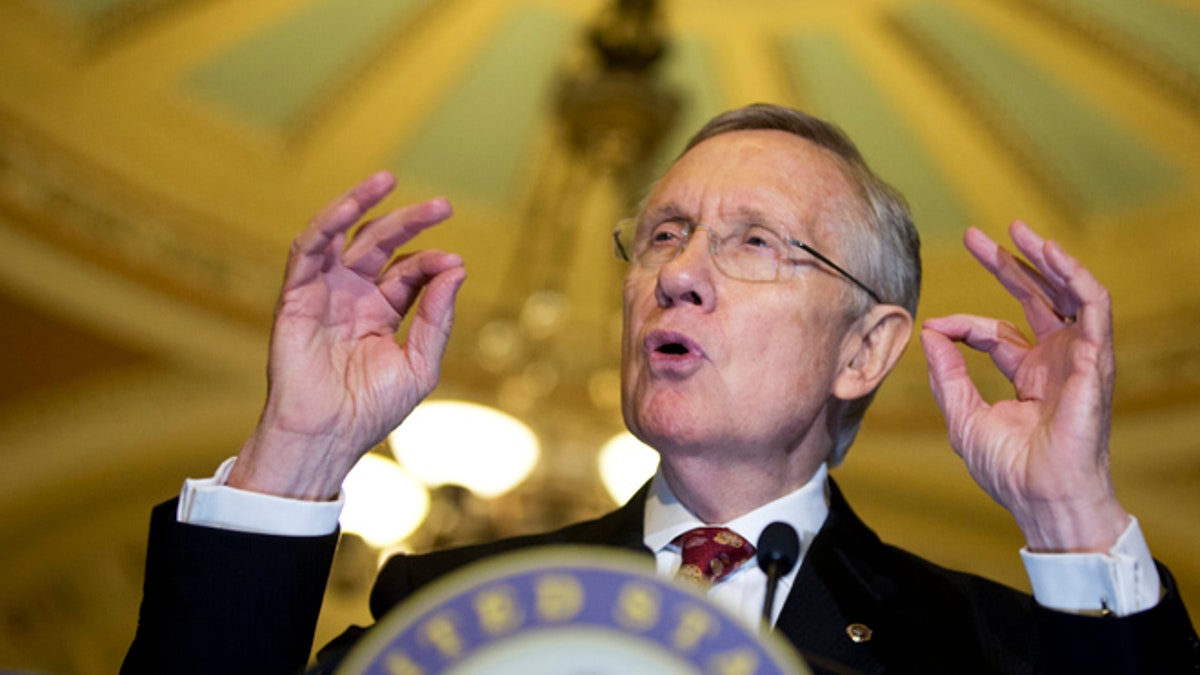
Nov. 19, 2013: Senate Majority Leader Harry Reid, D-Nev., speaks to the media on Capitol Hill in Washington. (AP)
Senate Democrats bowled over Republicans on Thursday to win approval for a highly controversial rule change which would limit the GOP's ability to block nominees, in a move Republicans called a "raw power grab."
"It's a sad day in the history of the Senate," Minority Leader Mitch McConnell, R-Ky., said after the vote.
Majority Leader Harry Reid, D-Nev., moving quickly following days of speculation, used the so-called "nuclear option" to pass the change. Typically, major changes like this take 67 votes, but he did it with just a simple majority.
With Republicans fuming, the change weakens the power of the minority to stall nominations for top positions. Instead of needing 60 votes to break a filibuster, the change means Democrats will now need just 51.
President Obama, speaking Thursday from the White House briefing room, said the change was needed to deal with Republicans' "unprecedented pattern of obstruction."
He cited, among other stand-offs, the bid by Republicans to filibuster his nomination of Chuck Hagel, a former GOP senator, for Defense secretary. "For the sake of future generations, we can't let it become normal," he said.
Republicans charged that Democrats were merely trying to shift focus away from ObamaCare with the move.
"Today we face a real crisis in the confirmation process, a crisis concocted by the Democrat majority to distract attention from the ObamaCare disaster and, in the process, consolidate more power than any majority has had in more than 200 years," Sen. Orrin Hatch, R-Utah, said in a statement immediately following the historic vote.
"It sounds to me like Harry Reid is trying to change the subject and if I were taking all the incoming fire that he's taking over Obamacare, I'd try to change the subject too," House Speaker John Boehner said.
Reid won approval for the change on a 52-48 vote.
Regardless of Reid's underlying motivations, the vote Thursday marks a major change in Senate rules. The filibuster, for better or worse, has been a defining feature of the Senate for decades. While this makes the Senate one of the slowest-moving legislative bodies in the world, it also prevents legislation and appointments from moving too fast.
The vote on Thursday vastly reduces the power of the minority to stall nominations and makes it easier for federal judges to get lifetime appointments.
Even Democrats have supported the right to filibuster in the past. The late Sen. Robert Byrd, D-W.Va., said in 2010 that changing the rules would "destroy the uniqueness of this institution."
"In the hands of a tyrannical majority and leadership, that kind of emasculation of the cloture rule would mean that minority rights would cease to exist in the U.S. Senate," he said.
The change applies to nominations for federal court and other top positions, though not for the Supreme Court.
Reid got the ball rolling on the rule change late Thursday morning. Frustrated by Republicans' stonewalling of numerous Obama nominees, he cast the shift as vital to the Senate's survival.
"The Senate is a living thing, and to survive it must change," he said on the Senate floor.
But the maneuver itself threatens to make the bitter atmosphere on the Hill even more toxic, imperiling the prospect for future agreement on everything from immigration to the budget.
McConnell charged that Reid's attempt proves the Democrats are willing to "do and say just about anything" to get their way.
The change is the most far-reaching to filibuster rules since 1975, when a two-thirds requirement for cutting off filibusters against legislation and all nominations was eased to the 60-vote level. It delivers a major blow the GOP's ability to thwart Obama in making appointments, though Republicans have promised the same fate would await Democrats whenever the GOP recaptures the White House and Senate control.
The clash occurred as Democrats have grown increasingly irritated by the GOP's derailing of Obama's selections for top jobs, including three picks for pivotal judgeships in recent days.
Republicans say they are weary of repeated Democratic threats to rewrite the rules. They say Democrats similarly obstructed some of President George W. Bush's nominees and argue that the D.C. Circuit's caseload is too low, which Democrats reject.
Nomination fights are not new in the Senate, but as the hostility has grown the two sides have been edging toward a collision for much of this year.
The latest battle is over Obama's choices to fill three vacancies at the U.S. Court of Appeals for the District of Columbia Circuit. Since Halloween, GOP filibusters have derailed the president's nominations of District Judge Robert L. Wilkins, law professor Cornelia Pillard and attorney Patricia Millett for those jobs, which are lifelong.
The D.C. Circuit Court is viewed as second only to the Supreme Court in power because it rules on disputes over White House and federal agency actions. The circuit's eight judges are divided evenly between Democratic and Republican presidential appointees.
The Associated Press contributed to this report.




